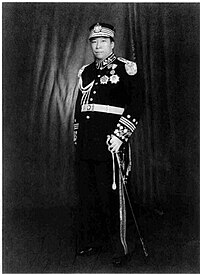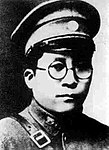Yang Hucheng
Yang Hucheng | |
|---|---|
 Yang Hucheng | |
| Personal details | |
| Born | 26 November 1893 Pucheng County, Shaanxi, Qing dynasty |
| Died | 6 September 1949 (aged 55) Chongqing, Republic of China |
| Political party | Kuomintang (1924 — 10 June 1949 |
| Military service | |
| Allegiance | |
| Branch/service | |
Yang Hucheng (traditional Chinese: 楊虎城; simplified Chinese: 杨虎城; pinyin: Yáng Hǔchéng; Wade–Giles: Yang Hu-ch'eng) (26 November 1893 – 6 September 1949) was a Chinese general during the Warlord Era of Republican China and Kuomintang (KMT) general during the Chinese Civil War.
Warlord years
[edit]Yang Hucheng joined the Xinhai Revolution in his youth and had become a popular warlord of Shaanxi Province by 1926. Following the defeat of Feng Yuxiang and Yan Xishan in the Central Plains War of 1930, Yang allied himself with the Kuomintang's Republic of China government (the Nanjing Nationalist government),[1] and became commander of the Kuomintang's Northwestern Army. Ordered to destroy the newly established Chinese Communist Party (CCP) stronghold at Yan'an with Zhang Xueliang's Northeastern Army in 1935, both Yang and Zhang were impressed with the Communists' determined defense and fighting capabilities. They were also convinced by the CCP proposal for a united Chinese defense against the Japanese invasion of China, in contrast to the Kuomintang strategy of "first internal pacification, then external resistance", a policy under which the encroaching Japanese forces were appeased in order to buy time to defeat the CCP.
Xi'an Incident
[edit]In November 1936, Kuomintang chairman Chiang Kai-shek flew to Xi'an in early December to speak to troops under the command of Yang and Zhang who no longer wanted to fight the CCP. On the night of December 12, 1936, bodyguards of Yang and Zhang stormed the cabin where Chiang was sleeping and attempted to arrest him. Although Chiang managed to initially evade capture, he was injured in the process and was arrested the following morning by Zhang's forces.[2]
Yang and Zhang forced Chiang into negotiations with CCP representatives Zhou Enlai and Lin Boqu, which resulted in peace between the Nationalists and Communists and the Second United Front against the Japanese invasion, with Chiang taking command of the CCP forces. In the aftermath, Zhang Xueliang returned to Nanjing with Chiang Kai-Shek, where he was arrested upon their arrival, and Yang was later secretly arrested. For a time, he was detained at Xifeng concentration camp, which closed in 1946.[3]
Imprisonment and extrajudicial killing
[edit]Yang remained imprisoned in Chongqing throughout the rest of the Second Sino-Japanese War. In 1949, acting Chinese president Li Zongren, who favored negotiations with the CCP, ordered the release of Yang Hucheng, but the order was not implemented. On 10 June, the Central Supervisory Committee of the Kuomintang decided to permanently expel Yang from the party.[4]: 8938
Shortly after the Communist capture of Nanking (Nanjing) near the end of the Chinese Civil War, the KMT army prepared to abandon Chongqing where Yang was imprisoned. On 6 September 1949, on the orders of Chiang Kai-Shek, Yang Hucheng was killed alongside his son, his daughter, his secretary Song Qiyun, Song's wife, and their youngest son at the Sino-American Cooperative Organization headquarters in Geleshan, Chongqing.[4]: 9004 Some of Yang's officers were killed in November that same year,[5] shortly before the CCP's capture of Nanjing near the end of the Chinese Civil War. After the founding of the People's Republic of China, Yang and his family and cohorts were buried in what is now the Martyrs Cemetery of General Yang Hucheng (杨虎城烈士陵园) in Chang'an District, Xi'an, in a funeral officiated by Peng Dehuai.[6] Some of Yang's surviving family members joined the CCP.[7][8]
In June 1955, Yang Jinxing, a KMT officer who had implemented the order to kill Yang Hucheng in Geleshan in 1949, was arrested by the Chongqing Public Security Department and charged with the murder of Yang Hucheng and others. Jixing had changed his name and hidden for many years before being arrested. After interrogation and public trial by the Chongqing Intermediate People's Court, he was sentenced to death and executed immediately.[9]
-
Yang Hucheng
-
Yang Hucheng
-
Memorial statue of Yang Hucheng in Gele Mountain (Geleshan), Chongqing
References
[edit]- ^ "China - Civil War, Nationalists, Communists | Britannica". www.britannica.com. Retrieved 2023-12-29.
- ^ Bernstein, Richard (2014). China 1945 : Mao's revolution and America's fateful choice (First ed.). New York. p. 29. ISBN 9780307595881.
{{cite book}}: CS1 maint: location missing publisher (link) - ^ Mühlhahn, Klaus (2009). Criminal Justice in China: A History. Cambridge: Harvard University Press. p. 138. ISBN 978-0-674-05433-2.
- ^ a b History of the Republic of China: Events Chronicle. Li Xin, editor-in-chief, Han Xinfu and Jiang Kefu, chief editors. Beijing: Zhonghua Book Company, 2011. 《中華民國史 大事記》第12輯。李新總編韓信夫、姜克夫主編。北京:中華書局,2011。Zhōnghuá Mínguó Shǐ: Dàshìjì. Dì-12 jí. Lǐ Xīn, zǒngbiān, Hán Xìnfū, Jiāng Kèfū, zhǔbiān. Běijīng: Zhōnghuá Shūjú, 2011. ISBN 9787101079982
- ^ 蒋介石屠杀杨虎城全家秘录
- ^ "杨虎城烈士陵园". www.htqly.org (in Chinese). 2022-07-06. Retrieved 2024-12-17.
- ^ "杨虎城曾想把17路军改编成红军". Cpc.people.com.cn. Retrieved 2013-01-19.
- ^ crystaldagger,redapple. "杨虎城的遗孀和儿女". Shang.cnfamily.com. Retrieved 2013-01-19.
- ^ Chen Xianfu (陈显涪) (2024-08-30). 刽子手杨进兴逃到川北农村 和老婆吵架露出了马脚 [Murderer Yang Jinxing Fled to the Rural Area of Northern Sichuan; His True Identity was Exposed when He Quarreled with His Wife]. Chongqing Morning News (in Chinese). Retrieved 2024-12-17.
- Dupuy, Trevor N. Harper Encyclopedia of Military Biography, New York: HarperCollins Publishers Inc., 1992.



